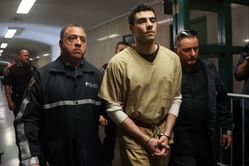
The Godfather is a novel written by Mario Puzo, an American author, and published in 1969.
The Godfather is a crime novel that tells the story of the Corleone family, a powerful Mafia family based in New York City, and their struggle to maintain their power and protect their interests. The novel was later adapted into a highly successful film trilogy directed by Francis Ford Coppola, with the first film released in 1972.
Who is Mario Puzo?

Mario Puzo, born on October 15, 1920, was an American author and screenwriter of Italian descent. He was born and raised in New York City, and his upbringing in the city's Italian immigrant community provided the inspiration for much of his writing. Puzo served in the United States Army during World War II and later attended City College of New York, where he studied writing and literature.
After graduation, he worked a series of odd jobs while trying to make it as a writer, eventually finding success with his 1969 novel, The Godfather. The Godfather was a massive commercial and critical success, and it established Puzo as one of the leading writers of crime fiction in the United States. The novel tells the story of the Corleone family, a powerful mob clan headquartered in New York and their battles to retain their authority.
Puzo collaborated with Coppola on the screenplays for The Godfather trilogy and received Academy Award nominations for his work. Throughout his career, Puzo wrote several other novels and screenplays, but he is best known for his work on The Godfather. He explored themes of power, loyalty, and family in his writing, often drawing on his own experiences growing up in an Italian immigrant community.
Puzo died in 1999 at the age of 78, leaving behind a legacy as one of the most influential and respected writers of crime fiction in the 20th century.
What is the novel The Godfather about?

The Godfather is a crime novel written by Mario Puzo and published in 1969. The Godfather novel is about a powerful Mafia clan, Corleone and his family based in New York City, who struggles to maintain their power and protect their interests. At the heart of the story is the patriarch of the family, Vito Corleone, a respected and feared Mafia boss known as the Godfather. The novel explores the complex relationships within the Corleone family and their interactions with other Mafia families and powerful figures in politics and business.
Throughout the novel, Puzo delves into themes of power, loyalty, and family, exploring the moral complexities of a criminal organization and the impact it has on those involved. The book also touches on issues of tradition and identity, as the Corleone family grapples with changing times and the challenges of maintaining their way of life in a rapidly evolving world. The Godfather has been praised for its vivid characters, intricate plot, and realistic portrayal of the criminal underworld. It has become a classic of crime fiction and a cultural touchstone, spawning multiple adaptations in film, television, and other media.
What are the other novels written by Mario Puzo?

Mario Puzo wrote several other novels in addition to The Godfather. Here are some of his notable works:
The Dark Arena (1955): Puzo's debut novel is a semi-autobiographical story about a disillusioned World War II veteran who becomes involved in the black market in post-war Germany.
The Fortunate Pilgrim (1964): This novel is based on Puzo's own mother and tells the story of an Italian immigrant family in New York City during the early 20th century.
Fools Die (1978): Set in the world of Las Vegas casinos, this novel follows a struggling writer who becomes involved with the Mafia and discovers the dark side of the gambling industry.
The Sicilian (1984): A sequel to The Godfather, this novel tells the story of Salvatore Giuliano, a legendary bandit and hero of the Sicilian independence movement.
The Fourth K (1991): This novel is a political thriller that imagines a future where the President of the United States is assassinated, and his vice president, a brilliant and controversial man, takes his place.









